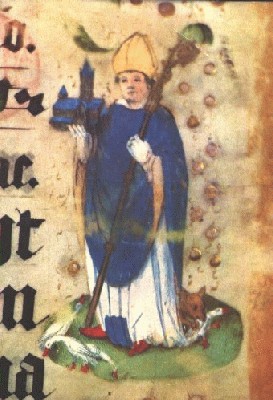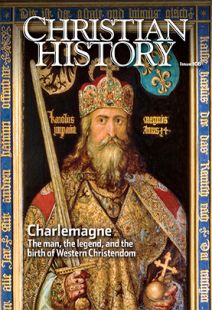GENTLE LUDGER CHANGED MINDS AND IMPRESSED A MONARCH

[Above: Illustration from an illuminated manuscript showing Saint Liudger—public domain, Wikimedia File:Saintliudger.jpg]
LUDGER did not let the pains of old age prevent him from doing God’s work. On Passion Sunday (the fifth Sunday of Lent, two weeks before Easter) the beloved priest preached at Coesfeld early in the morning and then at Billerbeck before noon. (Both are in the Westphalia region of modern Germany.) He died peacefully that night, in the early hours of this day, 26 March 809. His disciples and his sister were by his bed.
A Frisian, Ludger was born near modern Utrecht, Netherlands. His biographers said that from an early age he was deeply interested in spiritual questions. As a boy he had the joy of meeting the great missionary Boniface “when the hair of his head was white and his body was decrepit with old age.” Boniface’s evident holiness inspired Ludger to ask to be schooled by Gregory, a disciple of Boniface. Years later, Ludger wrote an affectionate account of Gregory’s life.
In 767, Ludger accompanied Alubert to York. Alubert was returning to England to receive consecration as a bishop. Ludger studied in York at the school of Alcuin, the greatest teacher of that age, but had to leave when his travel companions returned to the continent. He immediately petitioned Gregory for permission to return to York for more study. Obtaining reluctant assent, he spent three and a half more years with Alcuin.
Ludger chose to preach the gospel among his own people, where his knowledge of language and customs made it easier for him to win souls. At places where they sacrificed to their gods, he founded churches, and taught them to worship the only God. Where a spring was consecrated to an idol, he sanctified its waters by administering baptism there. He restored sight to a blind Frisian skald (singer of heroic poetry), converting him to Christianity.
However, Wittikind, king of the Saxons, attacked Frisia’s Christians, forcing Ludger to abandon his mission. He visited Pope Adrian I in Rome, then spent three years in a Benedictine monastery. When Charlemagne had subdued the Saxons, Ludger offered to work among them. His gentleness converted more of them than did Charlemagne’s forced baptisms. Ludger founded the monastery from which the city of Münster, Germany, takes its name.
His success was attributed to his great zeal for God. Once Emperor Charlemagne summoned Ludger intending to question him about his failure to richly decorate churches. (He preferred to use the money for charity.) Ludger kept the emperor waiting while he finished divine service. When Charlemagne asked why it had taken three messengers to get him to report, Ludger replied, “God is to be preferred to you, O King, and to all men.” After that Charlemagne held Ludger in high regard.
—Dan Graves
_ _ _ _ _
For more about the era of Charlemagne see Christian History 108 Charlemagne: the man, the legend and the birth of Western Christendom






